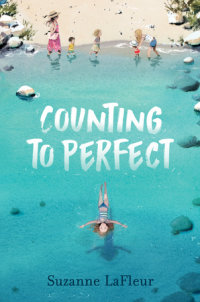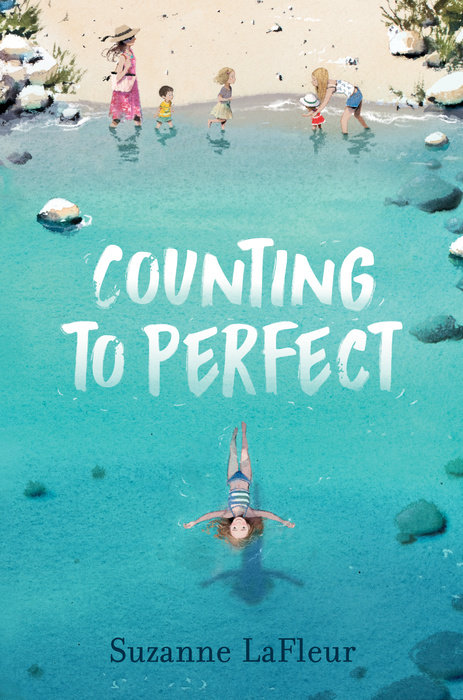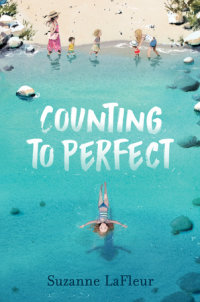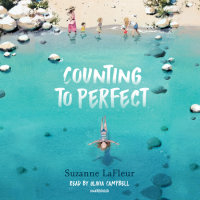I woke to a weight on my chest, Addie’s big blue eyes staring into mine. Her weight wasn’t bad, sixteen pounds of snuggle baby. But it was bright in my room, so I shut my eyes and groaned about being woken up.
“Morning, Cassie!”
I peeked at Julia, hovering over us.
Never leave Addie on the bed! Mom must have said it a hundred times.
Not that either of us would. Julia always rolled her eyes about that. She rolled her eyes at a lot of what Mom said.
Julia was very careful. Way more careful than you would have thought from how much Mom reminded her of things. I guess that was Mom’s job, to worry about everything.
Addie could sit up on her own, so Julia was letting her, but her hands were ready if Addie fell.
She didn’t. She looked into my eyes and smiled, then let out a shriek. She noticed her bare toes in front of her and leaned forward to meet them, opening her mouth wide and schlurping on them.
“Aren’t you excited?” Julia asked. “Soon you…
I woke to a weight on my chest, Addie’s big blue eyes staring into mine. Her weight wasn’t bad, sixteen pounds of snuggle baby. But it was bright in my room, so I shut my eyes and groaned about being woken up.
“Morning, Cassie!”
I peeked at Julia, hovering over us.
Never leave Addie on the bed! Mom must have said it a hundred times.
Not that either of us would. Julia always rolled her eyes about that. She rolled her eyes at a lot of what Mom said.
Julia was very careful. Way more careful than you would have thought from how much Mom reminded her of things. I guess that was Mom’s job, to worry about everything.
Addie could sit up on her own, so Julia was letting her, but her hands were ready if Addie fell.
She didn’t. She looked into my eyes and smiled, then let out a shriek. She noticed her bare toes in front of her and leaned forward to meet them, opening her mouth wide and schlurping on them.
“Aren’t you excited?” Julia asked. “Soon you can just be with us, all day long.”
My last day of school.
Julia’d hardly gone to school lately, but she’d gone enough, and graduated with her class two weeks ago.
Remembering her in her blue gown with red trim, her cap with the tassel, made a strange tickle in my throat.
I rolled over onto my stomach. Julia caught Addie in time, but she was still smiling.
They both were.
“Five more minutes,” I said.
I went to the kitchen to get some orange juice.
My hand met Dad’s, reaching for the fridge handle, too.
Probably getting milk for his coffee.
Dad paused, but not because of me.
He was looking at Julia’s six A finals stuck all over the fridge.
First he looked proud, then he got tears in his eyes, then he looked proud again.
Nothing of mine showed on the fridge anymore. Not my portfolio poem from Creative Writing or my first-semester report card or my fifth-grade class photo from last year. Not for months.
Everything had been covered up by Julia.
“Morning, Dad,” I said. “Um, I need the orange juice.”
“Morning, Cassie,” he said. Like he’d just noticed I was there. Even though our hands had been touching.
I grabbed the orange juice and poured a ridiculously large glass.
Let someone say something to me about it.
Not that anyone would.
I waited at the bus stop with my empty backpack. We hadn’t had any homework, but they hand back so many things on the last day of school that I would need something to carry it all home in. The two other girls from my street, Carly and Elena, stood a little apart from me. They kept glancing toward my house.
I looked back. Julia was on our front lawn, holding Addie’s hand high, making her wave goodbye to me.
I faced forward as the bus pulled up.
Carly and Elena were looking at Julia, though.
There were some good things about school ending.
I boarded the bus first and flung my bag into an empty seat. I sat down by a window that showed Julia and Addie, still watching and waving.
I folded my hands in my lap.
Julia’s face fell, and she lowered Addie’s hand.
The bus pulled away.
In the last five minutes of the day, our homeroom teacher handed out large, sealed yellow envelopes.
Everyone sat up straighter, ready to bolt.
Inside the packets: our report cards, summer assignments, and the names of our new homeroom teachers.
We were supposed to give them to our parents first--like that ever happened--and that’s how they were usually labeled: To the parents of so-and-so, printed stickers with our student ID numbers and home addresses.
But my label was different--a name tag stuck over the official one. It said, TO CASSIE, in several colors of bright marker, and then underneath, very small, (and her parents), like parents were a sorry thing to have to mention and I was most important.
I looked around. Most of the labels were the official kind. There were a couple other colored ones, but not that many.
We were released; sixth grade was over. We poured into the halls. Kids tore open their envelopes. What were the teachers going to do about it, really? The kids cheered or groaned as they discovered their fates.
Seventh grade was done in blocks. Your English teacher was also your homeroom teacher, and then you moved through the day more or less with the people in your block, even if you split later for language or math. Finding out our lead teacher would tell us how much--or little--we’d see our friends next year.
I could have argued that I had a right to open my envelope, if a teacher caught me, because it was addressed to me, but I held it tight and beelined for the tree out front, where I had promised to meet Piper and Liana so we could open our envelopes together.
They were both there already.
“Ready?” Piper asked.
She and Liana ripped open their envelopes. Envelopes with plain printed labels.
They showed each other their homeroom teacher’s name, and started jumping up and down and hugging. A match!
They stopped and looked at me.
“Aren’t you going to open it?”
But I already knew.
My envelope didn’t match on the outside.
I flipped it over and slid my finger along the seal, unclasped the metal prongs, slid out the papers.
Mr. Connelly.
I should have known. Julia had had him. She’d loved him. Like the label, everything he did was a bit more colorful than in the other rooms.
“That’s okay,” Piper said, after coming to check my paper. “Maybe we’ll still have lunch together.”
“Maybe.”
Liana had moved on already, flipping through the summer assignment packet. “Book report on one of the books . . . letter introducing ourselves to our homeroom teacher . . .”
Again, my page was different. The book list was the same, but I wasn’t asked to write a letter.



